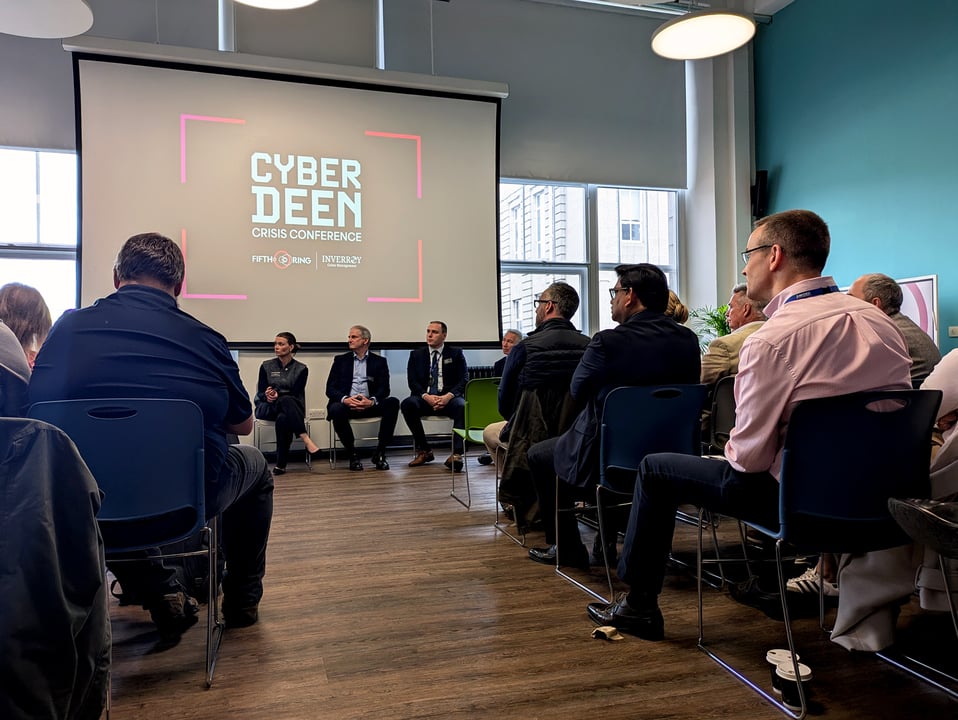Cyberdeen empowers Aberdeen businesses with cyberattack Strategies

Aberdeen, UK – Over 70 attendees from a diverse range of sectors gathered in Aberdeen for a free, half-day event, Cyberdeen, organised by Fifth Ring, the international B2B marketing specialist, and Inverroy Crisis Management. The event focused on preparing to defend against the inevitability of modern cyberattacks, stressing the need for multiple strategic response plans and active leadership involvement.
Expert speakers emphasised that cybersecurity is not just an IT issue; it's a strategic priority that must be owned by company leadership. “It’s not the head of IT that will be speaking to the media when a breach occurs—it’s senior leadership,” Alex Dowall of Cyber and Fraud Centre Scotland pointed out, underscoring the critical role of leadership in navigating and mitigating cyber risks.
Jennifer Maclennan, Regional Director, Europe, Fifth Ring, shared her extensive expertise in crisis communications, stressing the importance of effective communication and reputation management during a cyberattack. "By hosting this highly relevant event, we aimed to highlight the importance of acting now to protect against cyberattacks," Maclennan said. "Communication is critical, and a company’s reputation depends on how well they prepare for a cyberattack and how they react when it happens."
The event featured insights from Matthew Wardner, founder and Chief Executive at Inverroy Crisis Management, who discussed the latest crisis trends, alongside Professor Phil Wood, Security, Risk, and Resilience Specialist. Wardner emphasised, "Companies need to be proactive in developing a robust business continuity plan. As technology, including AI, advances, it becomes easier for cybercriminals to hack, lowering the barriers to knowledge. Planning for a cyberattack is an essential strategic issue that requires leadership attention."
Martin Smith, Managing Director at CyberPrism, focused on crisis leadership, drawing on his extensive experience as former Commandant General of the Royal Marines and former leader of the UK’s maritime counter terrorism force. He explained that strategy planning and effective communication at the leadership level is essential for companies to proactively address cybersecurity challenges.
The Cyber and Fraud Centre – Scotland’s Head of Cyber and Fraud, Alex Dowall, further highlighted the necessity of an imminent cyber incident response plan, urging businesses to create multiple plans to address different types of attacks. His session offered practical advice on the critical components of a robust incident response strategy. Detective Constable Craig Wilson and Norman Stevenson offered the police’s perspective on incident response, with guidance on what the police can and can’t do during and after an attack.
Throughout the event, local case studies and examples were presented, offering tangible insights into how businesses in the Aberdeen area have experienced the complexities of cyberattacks. The audience took a keen interest in discussions about forming incident response teams and the importance of cross-departmental involvement in preparing for various attack scenarios.
The Q&A session touched on a variety of critical topics, from how smaller organisations and charities can effectively plan for and manage an attack to strategies for securing buy-in from management teams. Communication was another key theme, with attendees seeking advice on clarity in crisis messaging. The panel emphasised the need for simple, business-focused communication during an incident, highlighting how getting this right is essential to both internal understanding and public perception. Further questions addressed the role of business insurance in business continuity planning, with Towergate Insurance Brokers joining the panel to offer advice on this complex area of concern.
Attendees left with actionable insights and practical strategies to help them prepare to navigate the rapidly evolving landscape of cyber threats.



